
We recently reported on Dave MacLeod's ascent of his first 8C boulder - Practice of the Wild in Magic Wood, Switzerland. A new film in which Dave talks about the process of training for and working the problem has been released by Dark Sky Media and Mountain Equipment. Dave claims he is climbing harder at the age of 37 than he was 10 or 20 years ago - but what has allowed for this improvement? As is typical of Dave, steely dedication and a meticulous approach to training proved essential.
Watch the film and read our interview to find out more...
Had you tried many other 8Cs previously?
No I don’t think I’d tried any. Most of my bouldering is on unclimbed stuff in Scotland. I’ve only had a couple of trips to Chironico around ten years ago and then a few trips to Magic Wood in the last three years.
What made you choose to try Pratice of the Wild as your first 8C, and when did you first try it?
I tried it in 2012 on my first trip in Magic Wood. I couldn’t do any of the hard moves but I just thought it looked like a really inspiring line.
Would you say it was of a particular style that suited or did not suit you?
Well you have some opportunities to use your feet on it, so in that sense it would suit me because I’m pretty weak and need to use my feet. I also did some okay links on In Search of Time Lost (8C) while I was there and that is definitely my anti-style: pure power and fewer chances to make the moves easier with footwork. I’d love to go back and try it someday. If I could do that, I’d definitely have made some real progress in my strength.
You are very much an all-rounder, excelling in multiple disciplines. How does bouldering to a high level affect your performance in sport and winter climbing?
At a low level, they complement each other because you learn a broad base of sport and climbing specific skills, but the higher up the grades you get, the more difficult it is to progress in multiple disciplines at the same time. Winter climbing is especially tricky I think. If I do a lot of winter climbing, my bouldering level will drop right back to about 8A or even below. But there are a lot of individual factors in there, playing a role. For instance, when I’m heavy, I find it much harder to switch between disciplines. If I’m lighter, I can basically get away with less specific training for a given level of climbing. But that may not work for someone with a different build.
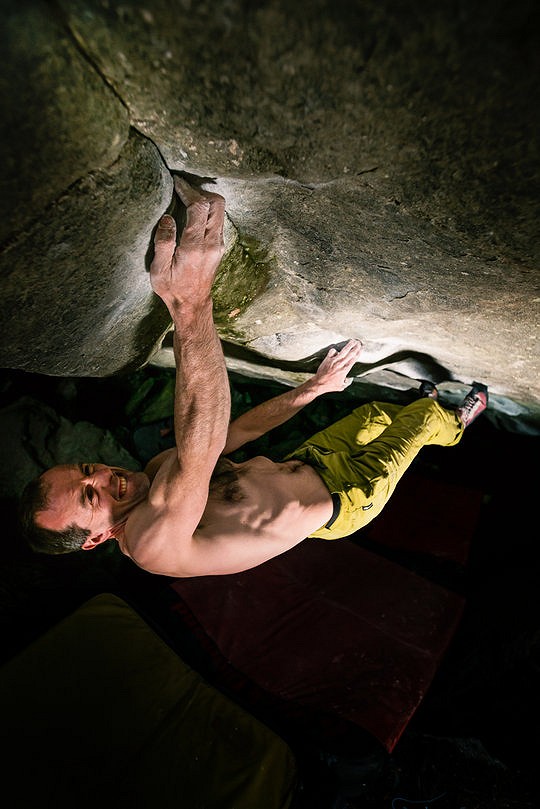
Projecting a boulder problem could be considered less time-consuming and less committing than investing in a hard trad or sport route. Was the process of working this problem different - say more or less intense - in the end?
I don’t know about that. It’s not easy to make real strength gains, especially when you are not in your late teens. It’s true that there are a few less hours of climbing time involved in bouldering training. But the difference is not all that much and the risk of getting injured is quite high. So overall it’s still difficult to pull off a big improvement in bouldering if you are already at quite a high level. In this case, the most difficult aspect of the training to be able to climb Practice was researching how I should train for it. I put a lot of hours of reading into that!
How closely matched was your model to the actual problem? Is this level of specificity in training your usual tactic for hard routes and problems, or was this a first?
The model I made wasn’t very closely matched. It’s not actually desirable to match it closely - it’s better if it’s a caricature of the real thing, which accentuates the moves you are weak on. On Practice of the Wild, I knew I was weak on two powerful gaston moves, so built the model around those moves. I’ve done this before a couple of times and it maybe helps a bit. But to be honest, I think it’s a minor player compared to the other changes I made in my training.
How were conditions? I heard you had to resort to some drastic measures…
I’m spoiled because Scotland is pretty easy to get good conditions for bouldering - we have long spring and autumn seasons with loads of wind. It’s a bit more difficult in Magic Wood - the boulders take ages to dry out after rain or snow because of the shelter in the trees and lack of wind. I did my usual rest day routine of brushing all the snow off the top of the boulder and cleaning all the topout so it didn’t seem so much.
Do you gain the same level of satisfaction from climbing at your very limit on a boulder as you do on a sport route or trad route?
Yes, maybe even more so. You’ve got to be really focused to get to your limit on a boulder and really sensitive to small nuances of the moves and how to squeeze out every last bit of power and accuracy. If you try something that is genuinely hard for you, it’s a great challenge to get all your preparation right and have good attempts with very few errors.
You mention that you're climbing harder at 37 than you were at 27 or 17. What have you learned that has brought on this improvement?
That’s kind of hard to summarise in a short answer - hence I wrote two books covering just a part of what I’ve learned! But here are a couple of overarching themes. I’ve learned a lot about how to take advantage of my strengths, and work my weaknesses. So I know when to copy what other people do and when to do my own thing that suits my individual profile of abilities. I’ve learned a lot about how to assimilate both raw and applied sports science and adapt it to fit my own training for climbs. When I think back to when I was doing my sport science masters - it was kids stuff by comparison. We took so many things at face value without suitable scepticism of science and the opinions of prominent athletes or coaches. I guess that was definitely a lesson learned the hard way and much time wasted. Finally, at a more practical level, I’m learning a bit better how to control my weight, which has always been a problem for me in climbing. In fact, learning about this was the best and most exciting thing about preparing for Practice of the Wild.
"This can't be real!" - you mention that more than on any other climb, you experienced a sense of disbelief on completing it. Have any other ascents come sufficiently close?
Well I do remember being in state of disbelief when I did my first 8c sport route in 2001. I just didn’t think I was cut out for anything harder than 8b. I guess the same goes for the boulder grades. It’s a bit weird hanging out under all these world class problems in Magic Wood and nearly all the other folk trying them are not far off half my age!
Partly why I had such disbelief at climbing Practice of the Wild was because of the time I’ve spent getting all my surgeries over the past three years. This time last year I had just spent three months on crutches. With all that time recovering from the insult of surgery, it gets hard to believe you’ll ever feel physically good again. Even once I was climbing again I still took ages, and a lot of effort to build up some agility. I’m definitely less agile than I was, these injuries do leave a mark, but I have compensated for it in other ways, such as just being stronger.
"You should just forget about any sense that your time is limited." - Broadly speaking, what are the main misconceptions that you have encountered in people's approach to climbing past your 20s?
Well for a start, I think if you frame your thinking around improvement at an older age as being unusual, you are already putting yourself at risk of bias that it is more difficult, or maybe impossible. In other words, it can become a self-fulfilling prophecy. That’s exactly what many older athletes do - they decide it’s too hard to keep improving, then stop trying. The fact that older people climbing hard is not the norm doesn’t actually say anything about whether it’s possible or not. It’s association, not causation. There are some things that undoubtedly stack against you as an older athlete, and some things that are easier. A lot of it is just arranging your life to make climbing hard possible. Folk just get too damn busy. Being prepared to go to more extreme lengths really helps to make it all work. Our society rewards moderation all the time and achieving your potential in sport is defined as the opposite of moderation! For example, most folk live in cities and have busy jobs. They make a compromise to buy a house near a good climbing centre. But in many cases, after they put their kids to bed they are too knackered to get back in the car and go out and train. It works for a month when you are really determined, but it’s not a formula for long term progression.
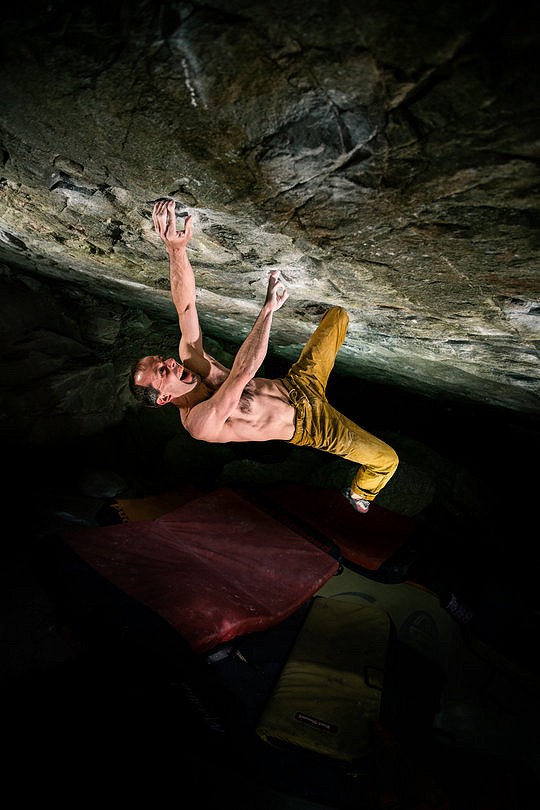
People this busy who want to improve in climbing have a choice, either drastically rearrange the schedule, or optimise it in some other way. Rearranging the schedule would be things like switching to working remotely - swapping out commuting time and wasted time in an inefficient work environment for training time at the wall. Or switching jobs, or moving out of the city. Or, if that isn’t the best solution, then building a board at home is a great alternative. That was my solution. I have a couple of jobs (writer, filmmaker, route setter, climbing coach) that take up a lot of hours, but with a fantastic board 2 metres from my back door, none of that means I can't find time in the day to complete my training.
Another issue is injury with age. But huge risk factors for injury are two sides of the same coin: weakness and detraining. Gaps in training and the subsequent loss of strength make it more likely you’ll get injured. Maintenance of muscle, strength and agility is protective against injury. So if you want to stay injury free, get training (at an appropriate level) and don’t stop! Also, people often live with chronic injuries they could recover from if they put in the necessary research and work. If your shoulders and elbows hurt - address it!
There are countless other things I could go on about. Sleep is one. The more I read about sleep, the more it shocks and terrifies me, and the more attention I pay to my sleep routine and sleep hygiene. The bottom line is that if you train and then go home and sleep an insufficient amount (~ 7.5 hours is necessary if the sleep is good quality, arguably more for athletes), or if that sleep is reduced in quality by your habits, then the training may well have been a waste of time, from which you’ll get no benefit. If poor sleep can knock a decade or two off your life expectancy, is it any wonder that it would at the very least stop you improving in sport as you approach age 40?
You are proactive in looking for new problems near your home in the Scottish Highlands. Have you discovered potential problems of 8B and above that you'd like to work on?
Yes definitely. The main one I have on my list is in the Arisaig Cave. Last December I did a project there called 4th Wave which is nearly as hard as Practice of the Wild for me. The cave has all sorts of long endurance links and I’ve already done some of them (Eternity’s Gate 8B/+ and All the Small Things 8A). The big link of Eternity’s Gate into 4th Wave is an obvious project. It would have to be Font 8C I think. Great climbing, in condition 6 months of the year, basically perma-dry and it’s in Arisaig which is a beautiful place. You can guess where I’ll be hanging out on wet days next winter!
***For a chance to win a Mountain Equipment clothing bundle, enter our UKC competition (Closes Monday 6th June).***

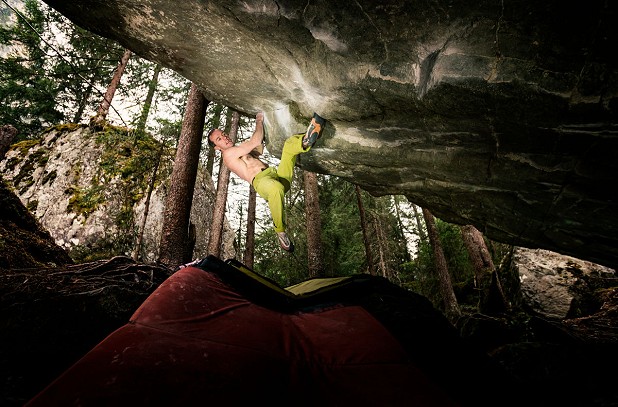
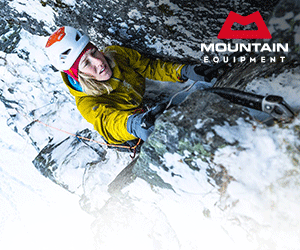



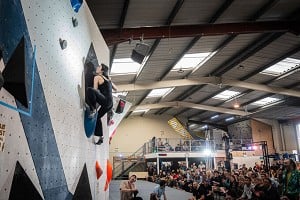
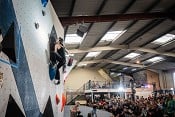
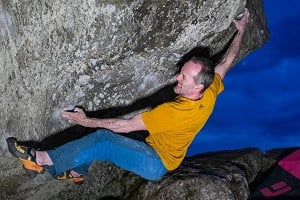
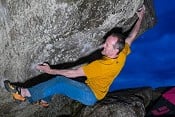
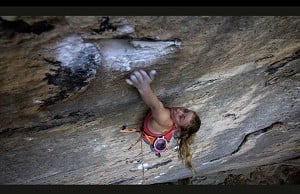
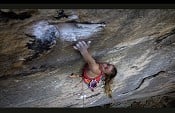



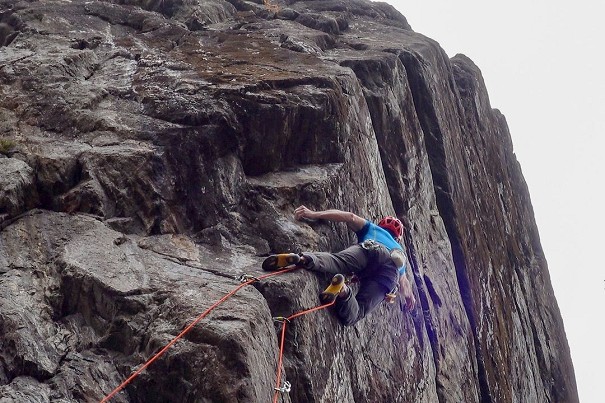
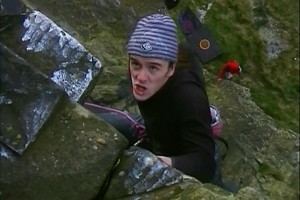
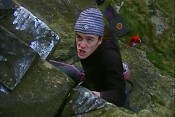
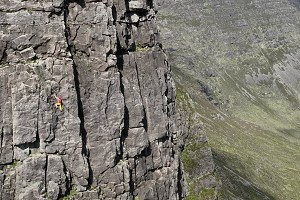
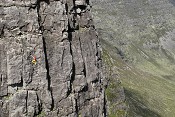
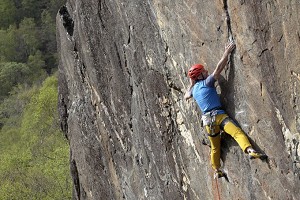
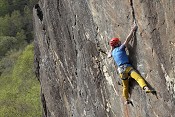
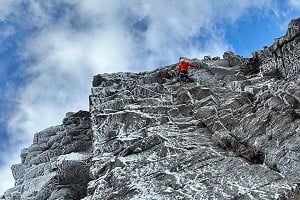
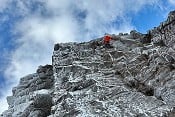
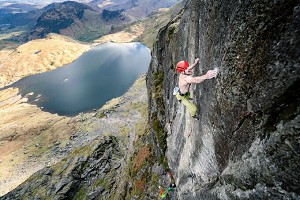
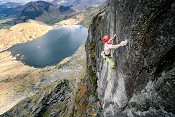
Comments